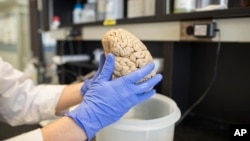WASHINGTON —
Scientists have identified a protein that appears to be a major cause of age-related memory loss. The discovery could lead to effective treatments for a problem that plagues many elderly people.
In 2010, an estimated 36 million people worldwide ages 65 and older were living with some form of dementia. But not all of those with this form of memory loss have Alzheimer’s disease, which also affects judgment and thinking, making it hard to work or take part in day-to-day life.
Now, researchers at Columbia University Medical Center in New York have identified a protein in a region of the brain called the hippocampus that is deficient in older people with memory loss, but not in those suffering from Alzheimer’s.
Eric Kandel, a Nobel Prize Laureate and expert on memory storage, led the study implicating the protein, called RbAp48, as a cause of memory lapses in older individuals. Researchers demonstrated RbAp48’s role in memory in laboratory animals.
“What happens if you take a young mouse and you knock out the gene for that protein in the young mouse? That mouse shows at a very young age, age-related memory loss," Kandel said. "If you take an old mouse and restore the protein, [you] reverse the age-related memory loss.”
Molecular studies of the brains of people with age-related memory loss reveal a deficiency of the protein in the dentate gyrus, one of a number of structures in the hippocampus.
That defect is not seen in the brains of a mouse model of Alzheimer's disease. In fact, Kandel said it was not possible to give Alzheimer’s to mice by manipulating their levels of RbAp48.
Because it may turn out that age-related memory loss is a condition separate and apart from Alzheimer's disease, Kandel said the finding could have important implications for people suffering from normal memory loss. “I think that we might be able to develop a therapeutic approach to age-related memory loss. We now have the possibility of developing better diagnostic ways of evaluating using imaging. And we might be fortunate in getting something that works effectively,” he said.
An article describing the role of the protein RbAp48 in age-related memory loss is published in the journal Science Translational Medicine.
In 2010, an estimated 36 million people worldwide ages 65 and older were living with some form of dementia. But not all of those with this form of memory loss have Alzheimer’s disease, which also affects judgment and thinking, making it hard to work or take part in day-to-day life.
Now, researchers at Columbia University Medical Center in New York have identified a protein in a region of the brain called the hippocampus that is deficient in older people with memory loss, but not in those suffering from Alzheimer’s.
Eric Kandel, a Nobel Prize Laureate and expert on memory storage, led the study implicating the protein, called RbAp48, as a cause of memory lapses in older individuals. Researchers demonstrated RbAp48’s role in memory in laboratory animals.
“What happens if you take a young mouse and you knock out the gene for that protein in the young mouse? That mouse shows at a very young age, age-related memory loss," Kandel said. "If you take an old mouse and restore the protein, [you] reverse the age-related memory loss.”
Molecular studies of the brains of people with age-related memory loss reveal a deficiency of the protein in the dentate gyrus, one of a number of structures in the hippocampus.
That defect is not seen in the brains of a mouse model of Alzheimer's disease. In fact, Kandel said it was not possible to give Alzheimer’s to mice by manipulating their levels of RbAp48.
Because it may turn out that age-related memory loss is a condition separate and apart from Alzheimer's disease, Kandel said the finding could have important implications for people suffering from normal memory loss. “I think that we might be able to develop a therapeutic approach to age-related memory loss. We now have the possibility of developing better diagnostic ways of evaluating using imaging. And we might be fortunate in getting something that works effectively,” he said.
An article describing the role of the protein RbAp48 in age-related memory loss is published in the journal Science Translational Medicine.







